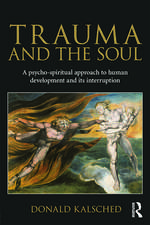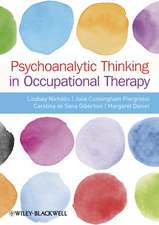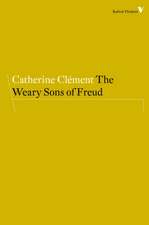Good Enough Endings: Breaks, Interruptions, and Terminations from Contemporary Relational Perspectives: Relational Perspectives Book Series
Editat de Jill Salbergen Limba Engleză Paperback – 25 mar 2010
- Can there be a relational criteria or paradigm for termination, and what would it include?
- How do treatment goals of the analyst and/or that of the patient affect the decision to terminate?
- How do recent developments in attachment theory and research influence the preparation to end analysis?
- What occurs for the patient after termination, and how do we assess the need for follow-up?
Din seria Relational Perspectives Book Series
- 5%
 Preț: 288.35 lei
Preț: 288.35 lei - 5%
 Preț: 227.31 lei
Preț: 227.31 lei - 5%
 Preț: 250.72 lei
Preț: 250.72 lei - 5%
 Preț: 316.59 lei
Preț: 316.59 lei - 5%
 Preț: 309.04 lei
Preț: 309.04 lei -
 Preț: 266.64 lei
Preț: 266.64 lei -
 Preț: 229.70 lei
Preț: 229.70 lei - 5%
 Preț: 231.82 lei
Preț: 231.82 lei - 5%
 Preț: 267.45 lei
Preț: 267.45 lei - 5%
 Preț: 301.83 lei
Preț: 301.83 lei - 5%
 Preț: 273.22 lei
Preț: 273.22 lei - 5%
 Preț: 331.64 lei
Preț: 331.64 lei - 5%
 Preț: 189.76 lei
Preț: 189.76 lei -
 Preț: 275.32 lei
Preț: 275.32 lei - 5%
 Preț: 289.38 lei
Preț: 289.38 lei - 5%
 Preț: 231.82 lei
Preț: 231.82 lei - 5%
 Preț: 940.24 lei
Preț: 940.24 lei - 5%
 Preț: 232.76 lei
Preț: 232.76 lei - 5%
 Preț: 275.61 lei
Preț: 275.61 lei -
 Preț: 213.39 lei
Preț: 213.39 lei - 5%
 Preț: 274.21 lei
Preț: 274.21 lei - 5%
 Preț: 233.26 lei
Preț: 233.26 lei - 5%
 Preț: 315.50 lei
Preț: 315.50 lei - 5%
 Preț: 287.14 lei
Preț: 287.14 lei - 5%
 Preț: 220.58 lei
Preț: 220.58 lei -
 Preț: 373.33 lei
Preț: 373.33 lei - 5%
 Preț: 253.45 lei
Preț: 253.45 lei - 5%
 Preț: 183.34 lei
Preț: 183.34 lei - 5%
 Preț: 318.22 lei
Preț: 318.22 lei - 5%
 Preț: 266.90 lei
Preț: 266.90 lei - 5%
 Preț: 274.81 lei
Preț: 274.81 lei - 5%
 Preț: 346.04 lei
Preț: 346.04 lei - 5%
 Preț: 219.50 lei
Preț: 219.50 lei - 5%
 Preț: 231.90 lei
Preț: 231.90 lei - 5%
 Preț: 324.11 lei
Preț: 324.11 lei - 5%
 Preț: 380.39 lei
Preț: 380.39 lei - 5%
 Preț: 332.27 lei
Preț: 332.27 lei - 5%
 Preț: 534.99 lei
Preț: 534.99 lei -
 Preț: 336.72 lei
Preț: 336.72 lei - 5%
 Preț: 416.67 lei
Preț: 416.67 lei - 5%
 Preț: 425.09 lei
Preț: 425.09 lei - 5%
 Preț: 456.44 lei
Preț: 456.44 lei - 5%
 Preț: 464.96 lei
Preț: 464.96 lei - 5%
 Preț: 382.83 lei
Preț: 382.83 lei
Preț: 323.31 lei
Preț vechi: 340.33 lei
-5% Nou
Puncte Express: 485
Preț estimativ în valută:
61.86€ • 64.59$ • 51.20£
61.86€ • 64.59$ • 51.20£
Carte tipărită la comandă
Livrare economică 05-19 aprilie
Preluare comenzi: 021 569.72.76
Specificații
ISBN-13: 9780415994538
ISBN-10: 0415994535
Pagini: 342
Dimensiuni: 152 x 229 x 23 mm
Greutate: 1.05 kg
Ediția:1
Editura: Taylor & Francis
Colecția Routledge
Seria Relational Perspectives Book Series
Locul publicării:Oxford, United Kingdom
ISBN-10: 0415994535
Pagini: 342
Dimensiuni: 152 x 229 x 23 mm
Greutate: 1.05 kg
Ediția:1
Editura: Taylor & Francis
Colecția Routledge
Seria Relational Perspectives Book Series
Locul publicării:Oxford, United Kingdom
Public țintă
Postgraduate, Professional, and Professional Practice & DevelopmentCuprins
Salberg, Introduction. Part I: Termination: Theories and Positions. Salberg, Historical Overview. Bergmann, Termination: The Achilles Heel of Psychoanalytic Technique. Britton, There is No End of the Line: Terminating the Interminable. Bernstein, Beyond the Bedrock. Holmes, Termination in Psychoanalytic Psychotherapy: An Attachment Perspective. Davies, Transformation of Desire and Despair: Reflections on the Termination Process from a Relational Perspective. Part II: On the Clinical Frontier. Salberg, How We End: Taking Leave. Grand, Termination as Necessary Madness. Cooper, The Changing Firmament: Familiar and Unfamiliar Forms of Engagement During Termination. Silverman, Will You Remember Me? Termination and Continuity. Layton, Maternal Resistance. Part III: Musings on the Multiple Meanings of Ending. Reis, Afterwardness and Termination. Skolnick, Termination in Psychoanalysis: It's About Time. Goldman, Parting Ways. Glennon, Relational Analyses: Are They More Difficult to Terminate? Bass, "It Ain't Over Till It's Over": Infinite Conversations, Imperfect Endings, and the Elusive Nature of Termination.
Notă biografică
Jill Salberg, Ph.D., is an adjunct clinical associate professor at the NYU Postdoctoral Program in Psychotherapy and Psychoanalysis and a member of the faculty at the Stephen A. Mitchell Center for Relational Psychoanalysis. In addition, she is on the faculty of the National Institute for the Psychotherapies and a training supervisor at the Institute for Contemporary Psychotherapy. She has published articles in Psychoanalytic Dialogues and Studies in Gender and Sexuality and has contributed chapters to The Jewish World of Sigmund Freud and Answering a Question with a Question: Judaism and Contemporary Psychoanalysis.
Recenzii
"In Good Enough Endings, Jill Salberg has given us a treasure. Psychoanalyses have to end. This has always been understood and more or less accepted by both patients and analysts. What rarely has been acknowledged openly is that the same logic cannot easily be applied to understanding why the ending of the personal relationship is so difficult for a patient to accept (work through) as simply a reasonable part of what is lost when the professional relationship 'terminates.' Transference explanations notwithstanding, this thorn in the side of psychoanalytic theory has never been systematically explored in a single volume from a perspective that fully respects psychoanalytic treatment in its personal as well as professional aspects. That is, until Salberg's extraordinary accomplishment.
Long pleading for a relational renewal, the topic of termination is here endowed with fresh life by some of the most inspired thinkers writing today, but take note - this volume is more than a collection of individual essays. Within the broad spectrum of analytic schools represented in its 16 exquisitely selected chapters, what gives the book its defining character is the openly relational sensibility that runs through it, relatively independent of traditional psychoanalytic differences. Personally moving vignettes, many of them unforgettable, are framed by a new clinical understanding of 'termination' in light of contemporary research that unites mind, brain, and human relatedness - an understanding that speaks to a unique bond within which the process of saying goodbye to a relationship is not reducible to the successful completion of a treatment. I discovered in almost every chapter a way of looking at 'endings' that was so reenlightening I found myself a bit envious of the recently minted analysts who will have a chance to read Salberg's volume during their professional 'beginnings.'" - Philip M. Bromberg, Ph.D., author, Awakening the Dreamer (2006) and Standing in the Spaces (1998)
"As Jill Salberg points out in her introduction to this timely book, our ideas about how treatment can and does end have not kept up with the many changes in our thinking about psychoanalysis and dynamic psychotherapy. The authors represented in this volume, most but not all of whom identify with contemporary relational psychoanalysis, grapple with the vexing problems involved in terminating a complex and often intimate relationship. Their various perspectives will certainly start an overdue, much needed conversation." - Jay Greenberg, Ph.D., Training and Supervising Analyst, William Alanson White Institute
Long pleading for a relational renewal, the topic of termination is here endowed with fresh life by some of the most inspired thinkers writing today, but take note - this volume is more than a collection of individual essays. Within the broad spectrum of analytic schools represented in its 16 exquisitely selected chapters, what gives the book its defining character is the openly relational sensibility that runs through it, relatively independent of traditional psychoanalytic differences. Personally moving vignettes, many of them unforgettable, are framed by a new clinical understanding of 'termination' in light of contemporary research that unites mind, brain, and human relatedness - an understanding that speaks to a unique bond within which the process of saying goodbye to a relationship is not reducible to the successful completion of a treatment. I discovered in almost every chapter a way of looking at 'endings' that was so reenlightening I found myself a bit envious of the recently minted analysts who will have a chance to read Salberg's volume during their professional 'beginnings.'" - Philip M. Bromberg, Ph.D., author, Awakening the Dreamer (2006) and Standing in the Spaces (1998)
"As Jill Salberg points out in her introduction to this timely book, our ideas about how treatment can and does end have not kept up with the many changes in our thinking about psychoanalysis and dynamic psychotherapy. The authors represented in this volume, most but not all of whom identify with contemporary relational psychoanalysis, grapple with the vexing problems involved in terminating a complex and often intimate relationship. Their various perspectives will certainly start an overdue, much needed conversation." - Jay Greenberg, Ph.D., Training and Supervising Analyst, William Alanson White Institute














